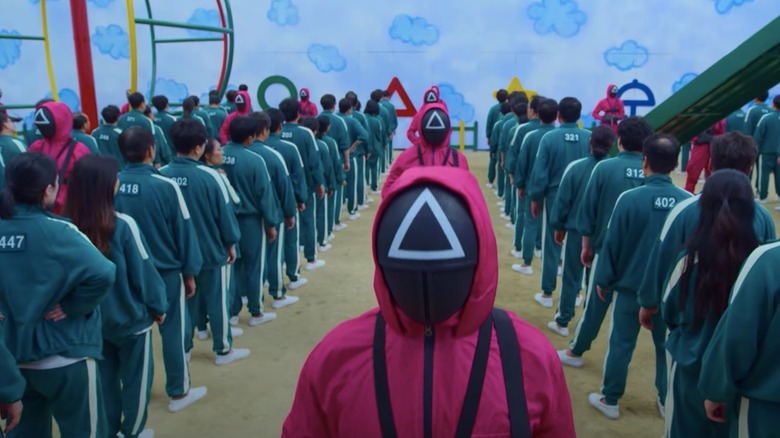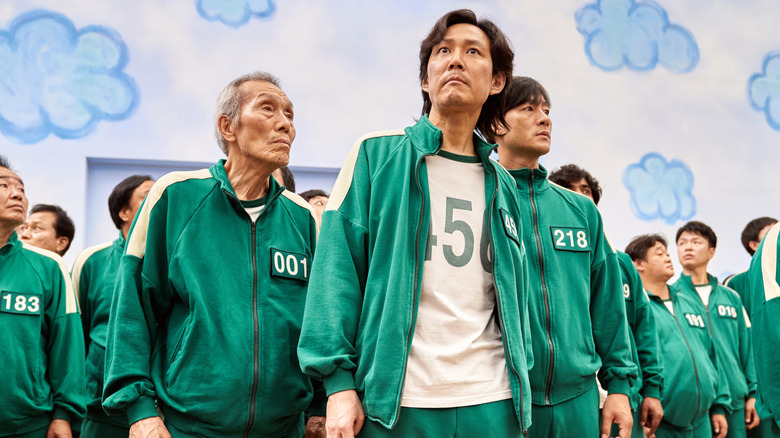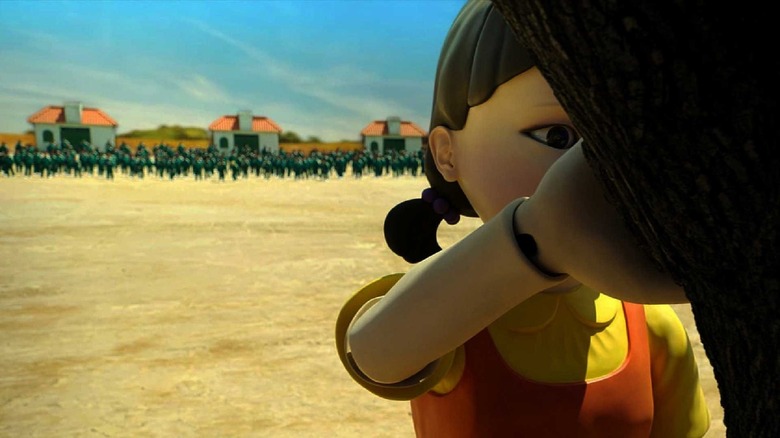Netflix's Original Title For Squid Game Would Have Been A Big Mistake
The exact date is never explicitly stated in the 2021 dystopian thriller "Squid Game," but it takes place in an all-too-familiar world wherein a vital line has been crossed. So many Korean citizens are living in extreme poverty, it seems, that they are eager to participate in the titular Squid Game, a mysterious competitive event that will, under the right circumstances, award the winner ₩45.6 billion. The competition consists of 456 players who engage in simple children's games (like Red Light, Green Light), with the losers being eliminated at the end of every round. The players, however, are surprised to learn that they will be murdered when they lose. The murderers are creepy masked thugs in pink tracksuits, and the event is overseen by the "Front Man," a masked man in black.
Lee Jung-jae from "The Acolyte" plays the lead character, a divorced gambler named Seong Gi-hun who has to win the Squid Game in order to pay off his many debts and retain custody of his young daughter. Lee won an Emmy for his performance in the show's first season while season 1 itself won many, many other awards besides. The series quickly leaked into the pop consciousness, with the masked guards becoming a regular installation at Halloween parties. Even fourth graders know about "Squid Game," even if they haven't seen it. They likely shouldn't anyway; it's an incredibly violent, scary show.
The series' title comes from a common children's game in Korea, generally just called Squid. Squid is a defensive tag-like game wherein the offense has to sneak around to the back of the defensive team's stronghold. The playing field vaguely looks like a squid, hence the name. Most American audiences watching "Squid Game" in Netflix likely didn't know the game, but the streaming platform was wise enough to keep the show's original title intact.
It seems, however, that the show's producers originally wanted to change the title to something more generic. In a 2021 interview with The Hollywood Reporter, Kim Minyoung, the vice president of content for Asia Pacific, talked about his idea for an alternate title. He wanted to call it "Round Six."
The title of Squid Game was almost Round Six
"Round Six" is a fine enough title, but it's vague. "Squid Game" is wonderfully oblique and eye-catching, and, as Kim explained, is obscure even in Korea. Squid, it seems, isn't really played by modern kids, having fallen out of favor on the playground. Think of, say, tiddlywinks in the United States. Kim wanted to change the title as he felt it wouldn't resonate with a Korean audience and certainly wouldn't be known by an international audience. "Round Six," he reasoned, would be better. In his own words:
"Squid Game, or ojingeo in Korean, is a real kids' game here, but not all Koreans actually know it. My generation knows it, but my niece's generation probably wouldn't. So, initially, we knew we wanted this show to travel but we were worried the title 'Squid Game' wouldn't resonate because not many people would get it. So we went with the title 'Round Six' instead, wanting it to be more general and helpful for telling people what the show is about; there are six rounds to the game."
It was the show's creator and director, Hwang Dong-hyuk, who suggested reverting to the original, feeling the oblique title was more eye-catching. Which, of course, it is. "Round Six" also evokes any number of other extant titles, such as the 2009 John Cena movie "12 Rounds" or "Series 7," the very similar death-game-reality-show movie from 2001. When Hwang suggested the change back to "Squid Game," Kim agreed:
"Director Hwang suggested that maybe we should go back to 'Squid Game,' because it's a unique show and this game is the essence. I think the more authentic title has actually played really well. The title, 'Squid Game,' together with the eye-catching artwork, really capture interest within our service, especially for audiences who have never watched a Korean show before, but are looking for fun things to watch."
It's certainly more striking. It even was used for a very real (and very ill-advised) Netflix game show spinoff.
Why are so many titles so boring?
Kim ultimately felt the title worked to the show's advantage, both in Korea and abroad. There was something strange about the title, encouraging investigation. As Kim put it:
"I think we tend to underestimate the curiosity that a lot of our members and audience have. In trying to make it really easy to understand what the show is, we could have made a big mistake. I'm so glad director Hwang steered us back to 'Squid Game.' It sparks curiosity and captures the story so well."
Of course, this speaks to a larger problem about film and TV titles in general: too few of them are descriptive or unique. Hollywood executives seem to feel that safe, broad, vague titles will draw a viewer's interest better than something unusual and outstanding. For example, there is a horror thriller currently in theaters starring Halle Berry as a beleaguered mom trying to protect her two young sons from an ineffable evil in the woods in a post-apocalyptic world. The film is called "Never Let Go," which could just as easily be the title of a disaster film or a romance. Sometimes, a broad title can function as being definitive and/or mysterious — "Cars" for instance, or "The Substance" — but I'll be dipped if I could remember the title of that one war epic with Oscar Isaac and Christian Bale about the fall of the Ottoman Empire off the top of my head. (It's called "The Promise," by the way. Snore.)
But you can be sure I can remember titles like "Smiling Fish and Goat on Fire," "Why Does Herr R. Run Amok?," "Geek Maggot Bingo," and "The Adventures of Buckaroo Banzai Across the 8th Dimension." Can you imagine if "Buckaroo Banzai" was called "The Racer?" No, "Squid Game" is the better title.
"Squid Game" season 2 will hit Netflix on December 26, 2024.


